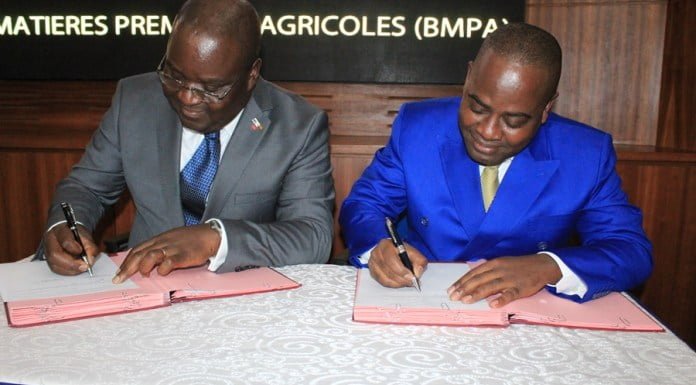
By Issiaka N’guessan, in Abidjan
The Council of Ministers, on June 7, took the decision to launch the Ivorian Agricultural Commodities Exchange! « The Council adopted a communication on the launch of the pilot phase for the operationalization of the activities of the Bourse des Matières Premières Agricoles (BMPA), » said Ivorian government spokesperson Amadou Coulibaly, Minister of Communication and the Digital Economy.
After years of awareness-raising among cashew industry players, and work carried out behind the scenes by the Bourse Régionale des Valeurs Mobilières (BRVM) without much communication, the government has decided to move into the active phase. But it will no longer be just an exchange for cash crops.
Raw cashew nuts, maize and fresh kola nuts to get the ball rolling
« The government has decided to set up a BMPA that will include both cash crops and food crops. It is an organized market in line with international standards, with the aim of correcting the distortions observed in the markets, making the movement of agricultural products more fluid and improving producers’ incomes, » the Council of Ministers declared.
This decision follows « the final results of the feasibility study, which identified the potential and established the operating conditions for such a market in Côte d’Ivoire, a pilot phase of BMPA operations is planned to start in the second half of 2023 for a period of 24 months ».
According to the same source, « the raw materials chosen for the launch of BMPA for this trial period are raw cashew nuts, maize and fresh kola nuts. »
World’s leading cashew and kola nuts producer
With a production of 1,024,000 tons of raw cashew nuts in 2022, Côte d’Ivoire is the world’s leading producer of this nut. In the 1980s, to prevent desertification and its harmful effects, reforestation policies included cashew trees in the northern regions of the country. From 1995, the market value of the nuts began to rise and has increased year on year.
Unfortunately, cashew nut producers were among the hardest hit by the 2010-2011 insurgency and the severe post-election crisis that shook the country for eight years. With Indian, Vietnamese and other buyers charging inflated prices, farmers were never able to get the best price for their production. For the 2023 marketing year, the farm-gate price was 315 F/kg, compared to 305 F/kg in 2022. Meanwhile, in neighboring Ghana, which produces slightly less than Côte d’Ivoire, the producer price is more remunerative. All this encourages high levels of smuggling and illegal trade, costing the Ivorian economy tons of product and foreign currency.

Côte d’Ivoire is also the world’s leading producer of kola nuts, producing at least 260,000 tons in 2017, and the leading exporter, with sales estimated at CFAF 150 billion in 2017. Until now, the industry has operated on an informal basis, with most production exported to such African countries as Senegal, Gambia and Mauritania.
« After rice, maize is the most widely grown grain, with average annual production of around 600,000 tons »
Fertilizer supplier Yara, which is active in the Ivorian agricultural market, says that maize is « the most widely grown grain after rice » in Côte d’Ivoire, with average annual production of around 600,000 tons.
Maize is widely consumed in the northern regions of the country, but is also used to feed cattle and poultry. Terrorism in the major maize-producing regions of northern Mali and Burkina Faso has significantly reduced maize production in these neighboring countries. In Côte d’Ivoire, « there are no more seed varieties, » says Dr Miaman Koné, a rural economist and president of the agricultural organization Yeya négoces.
In the meantime, « the pilot phase is being carried out by the BRVM under a management mandate agreement ». Ultimately, the BMPA should not only provide a basic price reference for negotiating commercial contracts, both nationally and internationally, and give us better control over the prices of our agricultural products, but also enable us to mobilize significant resources to finance the sector, to the benefit of all players in the agricultural value chain. »
Commenting on the challenges and prospects for the various players, Guillaume Liby, head of the economic and financial strategy consultancy firm William Khamey Advisors and country manager of Grofin in Côte d’Ivoire, points out that physical commodity exchanges were created to standardize trade in these products. He believes that there is an urgent need for a complete transformation of agricultural commodities into industrial products.






